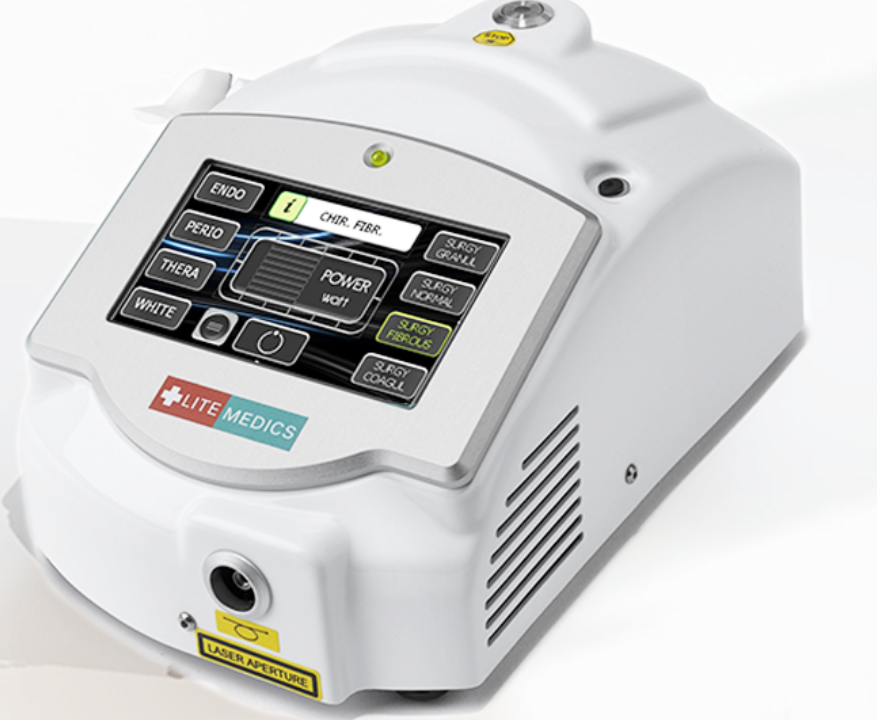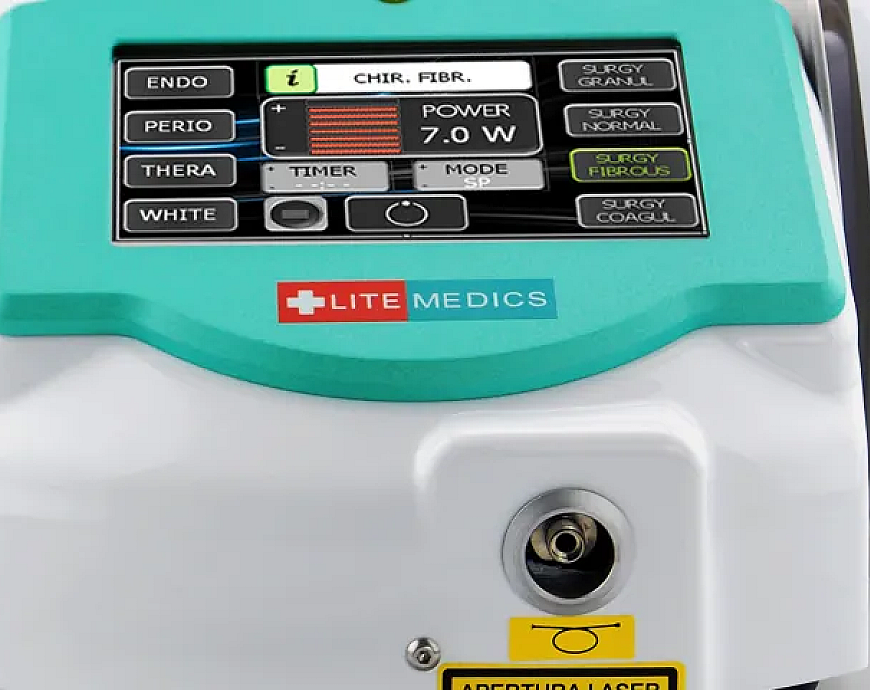The dental laser is a tool used in various dental procedures to reduce the likelihood of complications, increase the efficiency of treatments and improve post-procedural recovery times. First used more than three decades ago, the dental laser has become an indispensable resource in modern dentistry due to its versatility and ability to provide precise, minimally invasive treatments. The diode laser is one of the most frequently used types of lasers, especially in dental aesthetic treatments and in the treatment of gingival and periodontal diseases.
What is the dental laser?
The dental laser is a medical device that emits focused beams of laser light to treat various dental conditions. Due to its high precision and the possibility of better control over the dental procedure itself, the dental laser reduces the impact of the treatments on the oral tissues and implicitly the risk of complications. Compared to traditional methods, using a dental laser reduces pain and bleeding and promotes faster recovery, making it a preferred option for both patients and dentists.
How does the dental laser work?
The dental laser works on the principle of "light amplification by stimulated emission of radiation". The laser generates a highly precise and controlled, concentrated form of light energy that can be directed to interact with tooth or gum tissues. When the laser beam is applied to a specific tissue, it triggers a photo-thermal or photo-mechanical reaction, which facilitates the removal, remodeling or treatment of the targeted tissue with superior precision.
Types of dental lasers
There are several types of dental lasers, each with specific indications depending on the type of tissue and the procedure performed. The main ones are:
- diode laser;
- the erbium laser;
- the CO₂ laser;
- the Nd:yag laser.
What is the diode laser used for
The diode laser allows the doctor to adjust the intensity and frequency of the radiation emitted, making it suitable for a variety of dental procedures. Because it has a specific wavelength (for example, 980 nm), the diode laser allows efficient absorption in soft tissues, being especially recommended for simple surgical treatments, but also for routine procedures, especially laser descaling.
Gum treatments
With the help of a dental laser, the doctor can disinfect the affected tissues and remove the pathogenic bacteria from the periodontal pockets without damaging the healthy tissues. The procedure is minimally invasive, and the patient experiences less pain and inflammation compared to traditional methods. Commonly, dentists resort to performing common procedures with the help of laser. Laser scaling, for example, may be recommended to remove plaque and subgingival tartar, especially in cases of gingivitis or early periodontal disease.
Treatments for periodontal disease
The use of the dental laser is an effective option for cleaning and decontamination of periodontal pockets in patients with periodontal disease. The dental laser helps eliminate bacteria and inflamed tissue while stimulating the regeneration of healthy tissue. In addition, dental laser treatment reduces the risk of post-operative infections due to its antibacterial properties.
Frenectomies
A frenectomy is a procedure that involves removing the frenum, a small fold of tissue that can limit the mobility of the tongue or lip. Clinical studies show that the dental laser can be used in frenectomy to achieve a more precise cut with less bleeding and discomfort. Compared to traditional methods, the laser significantly reduces healing time, due to its ability to instantly coagulate blood vessels during the intervention.
Removal or reduction of soft tissue
Dental laser intervention ensures increased precision, being thus also suitable for procedures that require the removal of soft tissue, such as gingival excisions or tissue remodeling. The dental laser successfully vaporizes the affected soft tissue and allows the doctor to sculpt the gums with maximum precision without affecting the surrounding structures.
Treatments for herpes and canker sores
Dental laser therapy quickly relieves pain and accelerates the healing process by destroying the virus and stimulating cell regeneration. The dental laser reduces inflammation and discomfort in patients with herpes or oral thrush, while preventing frequent recurrences.
Bacterial decontamination
The dental laser can penetrate hard-to-reach places and remove bacteria from the root canal or periodontal pockets. Due to the ability of the dental laser to destroy pathogens without harming healthy tissues, laser decontamination is recommended for the long-term success of dental treatment.
Teeth whitening
Laser teeth whitening is an advanced cosmetic procedure that uses the dental laser to speed up the whitening process and achieve fast and effective results. During the treatment, a peroxide-based gel is applied to the surface of the teeth, and the dental laser activates the ingredients in the gel, intensifying the whitening reaction. Unlike traditional methods, laser whitening ensures better color uniformity and reduces the risk of tooth sensitivity.

The benefits of the dental laser
For patients. Laser technology brings multiple clinical benefits, helping to improve prognosis and increase patient satisfaction. The dental laser allows for the reduction of intraoperative discomfort, as well as the acceleration of the post-procedural healing process.
For the dentist. The dental laser allows the dentist to perform procedures with high precision, which translates into superior clinical results. In addition, due to its coagulation properties, the dental laser minimizes bleeding during surgery, which not only improves visibility in the operative field, but also contributes to easier management of the procedure.
The advantages of the diode laser for different categories of patients
In the case of people with various medical problems, the use of the dental laser is associated with a reduced risk of bleeding or infection, therefore with a reduced risk of complications.
For children, dental laser treatments are less frightening, without the noise of a dental drill. Also due to the fact that it produces no noise and no pain, the dental laser brings major benefits to patients with anxiety, reducing the stress associated with dental procedures.
+40787877799 | +40762573398
contact@dentarbre.comȘoseaua Colentina, nr. 16, Bl. A1, Rose Garden, Sector 2, Obor - Colentina - Doamna Ghica area, Bucharest, Romania
